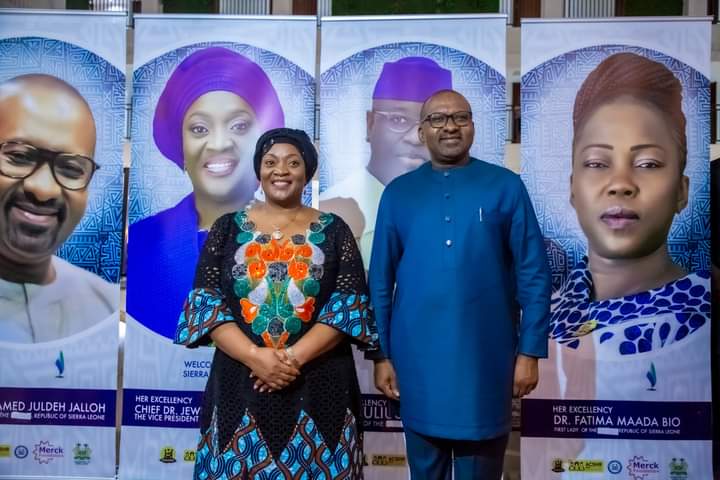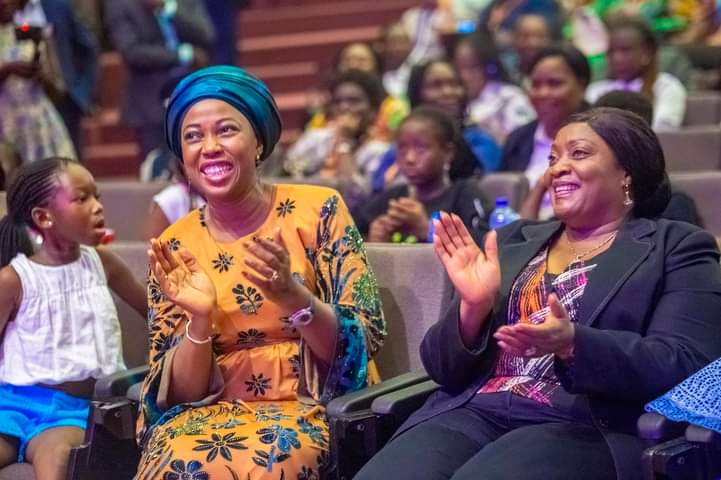Liberian Vice President, Jewel Howard Taylor, has hailed Sierra Leone’s hosting of the continental sexual and health rights conference, noting that it holds the key to eradicating shared problems faced by women across the sub region.
The 10th Africa Conference on Sexual Health and Rights (ACSHR) is being hosted in Freetown from 27th June to 1st July.
Mrs Taylor, who is a special guest at the event, said she felt it was “very apt” for Freetown to host the 10th edition of the biennial event.
“We are talking about issues concerning women, the disadvantages that we have and the fact that everyone across the world and here at home have been doing their best to help us get rid of all of the different things that put women behind and keep us under-served and under productive,” she said at a press briefing shortly after arriving in Freetown.
ACSHR is convened by the African Federation for Sexual Health and Rights, a group of sexual and reproductive health advocates and organizations. Its primary mandate is to advance sexual health and rights on the continent through knowledge management. The conference is the main vehicle of achieving this goal.
The last edition of the conference was held in Nairobi, Kenya in 2020.
According to the Sierra Leone government, Mrs Taylor is attending the conference on the invitation of First Lady Fatima Bio, who is the Honorary Chief Patron of the conference. The two women appear to share common passion for women’s sexual health rights.
Mrs Bio is championing a campaign against sexual violence against women and girls through her ‘Hands off our Girls’ initiative.
Liberia recently hosted a conference that brought girls from across Africa to discuss sexual and reproductive health issues.
According to Mrs Taylor, three issues came out of that conference in Monrovia – Teenage Pregnancy, harassment at of girls at school, either for sexual reasons or for money, and the inability of many underprivileged girls to access sanitary pads. The outcome of that conference, Mrs Taylor said, inspired her to initiate a sanitary pad bank at schools about two months ago.
The Liberia Vice President said the Freetown conference is symbolic in that while the Sierra Leonean capital got its name from its origin, which is it formation by freed slaves, the conference could be the key for freedom from health and sexual rights issues for girls.
“We are hoping this 10th [edition] will be an anniversary of freedom for the shackles that have held women back for centuries, so that we can begin a new slate,” she said.
“The issues concerning girls in Liberia, girls in Sierra Leone or in Guinea or Ivory Coast are the same because we are actually just one people dealing with the same issues,” she noted in response to a question from a member of the press.

Besides her engagement at the conference, Vice President Taylor was scheduled for various meetings with government officials, among them President Julius Maada Bio and the First Lady, as well as political parties and civil society leaders.
On Thursday, Mrs Taylor was the guest at the Parliament of Sierra Leone, where she addressed lawmakers and talked about the importance of fighting against sexual violence.
Her Sierra Leonean counterpart, Mohamed Juldeh Jalloh, hailed Mrs Taylor for traveling to Freetown by road, noting that it allowed her the opportunity to see much of Sierra Leone.
“Liberia and Sierra Leone are two countries and one people,” he said, expressing Sierra Leone’s commitment to the development of its neighbour.
UN data show that globally an estimated one in three women has experienced SGBV in her lifetime. According to Sierra Leone’s 2019 Demographic Health Survey, 62 percent of women aged 15-49 reported having experienced physical or sexual violence, one of the highest rates in the world.
ACSHR was convened in the Bintumani International Conference Center in Freetown, under the theme: ‘Accelerating the elimination of sexual and gender-based violence in Africa.’
It was preceded by a Youth Conference.

The conference provided “an opportunity to gain new knowledge and skills, to be exposed to different perspectives, and to fuel…advocacy on the issues” youths are most passionate about, Nadia Rasheed, UNFPA Representative to Sierra Leone, said at the opening session.
The United Nations provided coordinated technical, financial, and logistical support to the conference.
Over 350 participants reportedly attended it, drawn from across 41 African countries. The participants came from Civil Society, Governments, UN Agencies, human rights organizations and development agencies.
An important aspect of the conference is its emphasis on the youths. Half of the delegates are young people, a move deliberately designed to target the group of people who are leading the change, said Cherno Bah, CEO of Purposeful, the local host of the event.






















